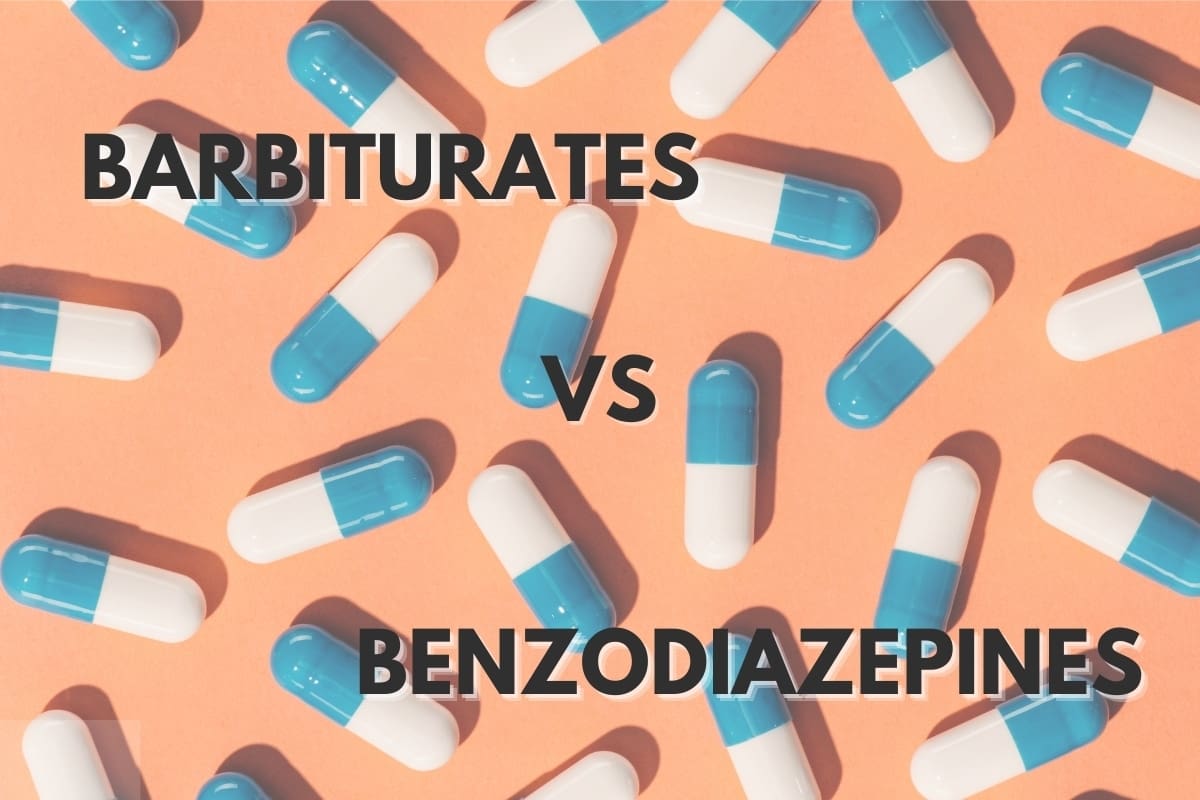You are getting very sleepy…but is it caused by a barb or benzo? Both substances start with the same letter (and can be bit of a mouthful). Both are in the same drug classification and both have sedating effects on the body that result in a feeling of calm and relaxation. The two substances have many similarities so it’s understandable why they are often mistaken for one another, but barbiturates and benzodiazepines are not the same things. The primary difference between the two is their mechanism of action which directly influences both how strong they are, how long their effect lasts, how addictive they can be, and more importantly, their potential to be dangerous.
What Are Barbiturates?
Barbiturates are a sedative, whose calming and relaxing effects are likened to those that are caused by alcohol. They are most commonly used to treat specific conditions such as seizures, anxiety, or as an anesthetic for surgery. Being central nervous depressants, they reduce nerve activity which results in muscle relaxation, slowed heart rate, and breathing. Barbiturates are classified as Schedule II substances having considerable potential for being misused and becoming habit-forming.
Types of Barbiturates
- Amytal
- Ascomp
- Butisol
- Donnatal
- Esgic
- Fioricet
- Fortabs
- Nembutal
- Seconal
How Do They Work?
Barbiturates cause central nervous system depression by affecting the gamma-aminobutyric acid neurotransmitter, also known as GABA. Specifically, barbiturates bind to GABA channels, causing them to remain open for a prolonged period of time which in turn, creates a negative charge. This negative change in voltage makes brain cells less responsive to nerve impulses (i.e. depressed), which is responsible for barbiturates’ sedative and analgesic properties.
When Are They Used?
Nowadays, barbiturate use is mostly limited to pre-operative settings. Due to a high likelihood of being abused or resulting in addiction, this type of sedative is rarely prescribed for managing ailments. If it is, it is done for a very short time frame. Barbiturates have largely been replaced by benzodiazepines due to their high risk of causing addiction or a fatal overdose. These limitations have resulted in illegal barbiturates being difficult to come by and as such, these drugs are less commonly found on the black market.
Drug Interactions and Potential Risks
Barbiturates have a narrow therapeutic dosage range—which essentially means that it’s very easy to overstep from safe to unsafe dosaging. Small differences in doses can produce drastically different side effects. Having such a fine line between a safe and a potentially dangerous dosage increases the likelihood of barbiturates having unintended—and deadly—consequences.
Further, barbiturate drugs do not mix well with others. They are particularly dangerous when combined with other central nervous system depressants resulting in excessive sedation, lethargy or coma. Barbiturates can quickly bee fatal if combined with opioids, antidepressants, antihistamines, over-the-counter (OTC) medications, alcohol, as well as its close pharmaceutical relative, benzodiazepines.
What Are Benzodiazepines?
More commonly referred to as “benzos”, benzodiazepines are also a class of sedatives and central nervous system depressants. Like barbiturates, benzos are commonly prescribed to treat conditions such as anxiety, seizures, and insomnia. However, they are also a commonly used medication for treating alcohol withdrawal and the favored drug type to do so.
Benzodiazepines are considered to be much safer than barbiturates, even though they do carry a relatively high likelihood of causing physical and emotional dependency, even when dosage instructions are followed. As such, benzodiazepines are typically only prescribed for short-term use.
Types of Benzodiazepines
Some of the most well-known types of benzos are also some of the most widely prescribed medications in the U.S. These include diazepam (Valium), clonazepam (Klonopin), alprozolam (Xanax), several of which are controlled substances. However, there are many other types of benzos, most focus on treating a specific ailment.
- Benzos used to treat anxiety disorders: Xanax, Vallium, Libruim, Tranxene, Ativan
- Benzos used to treat seizures: Klonopin, Onfi, Valium, Tranxene, Ativan
- Benzos used to treat insomnia: Prosom, Dalmane, Doral, Restoril, Halcion
- Benzos used as anesthesia: Versed, Valium, Ativan
- Benzos used to treat alcohol withdrawal: Librium
How Do They Work?
Similar to barbiturates, benzodiazepines primarily affect the body via the GABA neurotransmitter which is responsible for sending calming messages to the body. Benzos change the voltage in the brain from positive to negative and causes brain cells to be less sensitive. The primary difference between the two is that benzodiazepines do not stimulate the GABA receptor directly, they simply make GABA receptors more efficient. Benzodiazepines still produce a calming effect but don’t have as depressive an effect on the central nervous system as barbiturates do. This difference in their mechansim of action is why benzos are considered to be the weaker of the two and safer than barbiturates. However, their potency is considerable, and are still dangerous none-the-less.
When Are They Used?
Think of benzos as barbiturates 2.0. They are prescribed in virtually all of the scenarios where barbiturates used to be, but most often to manage seizures, anxiety, and insomnia. Many of them can be used interchangeable, though some types of benzos are used for very specific purposes. Benzodiapenes are very fast-acting and are extremely popular for treating panic attacks. Because they are more widely available than their predecessor, benzos have greater rates of abuse and benzo addiction is much more commonplace.
In a Nutshell: The Difference Between Barbiturates vs Benzodiazepines
These two “downers” are both central nervous system (CNS) depressants and have more in common than they have differences. They fulfill nearly identical purposes and work in very similar manners. The key difference between the two is that one is much more addictive and potent than the other, which led to its subsequent replacement.
Although benzodiazepines are meant to be a safer alternative to barbiturates, these types of drugs are far from harmless. According to SAMHSA’s 2019 annual substance use survey, nearly 6 million Americans misused prescription tranquilizers or sedatives, which includes benzos and barbiturates. Both drugs are prone to being habit-forming and can result in fatal overdoses. When either is combined with other drugs, the odds of fatal overdoses increase exponentially.

































